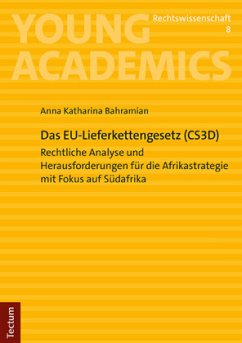
Revisiting Bilateral Investment Treaties in the 21st Century. A Kenyan and South African Experience

PAYBACK Punkte
0 °P sammeln!
Bilateral investment treaties (BITs) signed prior to the 21st century are problematic. Some countries with BITs signed during this period have since reviewed those BITs and taken action to address the disadvantages the BITs held for the host nation or have either resorted to eradicating some of their BITs. In particular, developing countries that signed BITs with developed nations seem to be disproportionately disadvantaged in these agreements.This research highlights Kenya's current BIT situation and compares it in light of another developing country, South Africa, with regards to its BIT exp...
Bilateral investment treaties (BITs) signed prior to the 21st century are problematic. Some countries with BITs signed during this period have since reviewed those BITs and taken action to address the disadvantages the BITs held for the host nation or have either resorted to eradicating some of their BITs. In particular, developing countries that signed BITs with developed nations seem to be disproportionately disadvantaged in these agreements.
This research highlights Kenya's current BIT situation and compares it in light of another developing country, South Africa, with regards to its BIT experience. Given that South Africa has undergone an extensive BIT review process and moves to change some of these BITs, this study compares and contrasts the Kenyan and South African experience. The study highlights the possible lessons that could be learnt from the South African BIT review experience and provides recommendations for the Kenyan government regarding its outdated BITs. The lessons and recommendations benefit not only Kenya but also other countries that are still to review their BITs as it adds to the literature on why it is important for countries with such BITs to revisit them and how they can go about the review mechanism best. In addition, the study is also significant as far as it raises awareness of the use and effects of BITs, thereby enabling countries that enter into such agreements to make informed decisions.
This research highlights Kenya's current BIT situation and compares it in light of another developing country, South Africa, with regards to its BIT experience. Given that South Africa has undergone an extensive BIT review process and moves to change some of these BITs, this study compares and contrasts the Kenyan and South African experience. The study highlights the possible lessons that could be learnt from the South African BIT review experience and provides recommendations for the Kenyan government regarding its outdated BITs. The lessons and recommendations benefit not only Kenya but also other countries that are still to review their BITs as it adds to the literature on why it is important for countries with such BITs to revisit them and how they can go about the review mechanism best. In addition, the study is also significant as far as it raises awareness of the use and effects of BITs, thereby enabling countries that enter into such agreements to make informed decisions.













